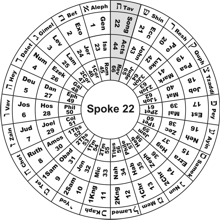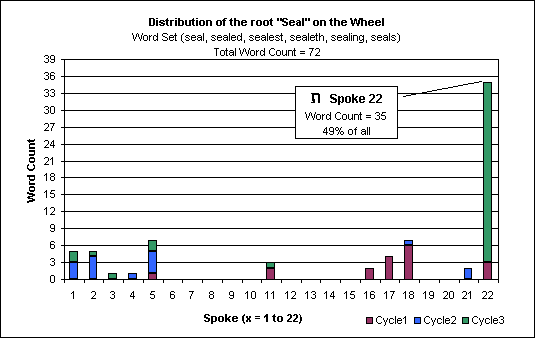|

Spoke 22
Song of Songs, Acts,
Revelation
|
 |
|
And I saw in the right hand of him that sat on the
throne a book written within and on the backside, sealed with seven
seals. And I saw a strong angel proclaiming with a loud voice, Who is
worthy to open the book, and to loose the seals thereof?
Revelation 5:1 (Spoke 22, Cycle 3)
|

Digital scan of the entry for Tav in
Ben Yehuda's Pocket Hebrew dictionary |
God
designed the symbolic meaning of the Twenty-Two Hebrew Letters to proclaim the message of the
everlasting Gospel. The meaning of each Letter derives from its name, position in the Alphabet, grammatical function
and associated KeyWords. The meaning of the Last Letter is very plain; Jews and Christians have agreed about
it from the beginning. As noted on page 21 of the BW book, its name  (Tav) is
a common Hebrew word that denotes a mark, sign, or cross.
In the ancient Hebrew script,
it was written alternately as (Tav) is
a common Hebrew word that denotes a mark, sign, or cross.
In the ancient Hebrew script,
it was written alternately as  or or  the latter being identical to the traditional form of the Cross of Christ, as seen in the digital scan of
Ben-Yehuda's Pocket Hebrew Dictionary
the latter being identical to the traditional form of the Cross of Christ, as seen in the digital scan of
Ben-Yehuda's Pocket Hebrew Dictionary  above.)
It is the origin of the corresponding
Greek Tau and Latin T. The famed Hebrew scholar Gesenius noted that it was "a sign in the form of a cross branded on
the thigh or neck of horses and camels." It is the elemental sign of ownership used by God to identity His faithful
Remnant in a vision He gave to the Prophet Ezekiel: above.)
It is the origin of the corresponding
Greek Tau and Latin T. The famed Hebrew scholar Gesenius noted that it was "a sign in the form of a cross branded on
the thigh or neck of horses and camels." It is the elemental sign of ownership used by God to identity His faithful
Remnant in a vision He gave to the Prophet Ezekiel:
And the Lord said, Go through the midst of the city, through
the midst of Jerusalem, and set a mark ( ,
tav) upon the foreheads of the men that sigh and that cry for all the
abominations that be done in the midst thereof. And to the others he said in
mine hearing, Go ye after him through the city, and smite: let not your eye
spare, neither have ye pity: Slay utterly old and young, both maids, and little
children, and women: but come not near any man upon whom is the mark ( ,
tav) upon the foreheads of the men that sigh and that cry for all the
abominations that be done in the midst thereof. And to the others he said in
mine hearing, Go ye after him through the city, and smite: let not your eye
spare, neither have ye pity: Slay utterly old and young, both maids, and little
children, and women: but come not near any man upon whom is the mark ( ,
tav); and begin at my sanctuary. Then they began at the ancient men which were
before the house. ,
tav); and begin at my sanctuary. Then they began at the ancient men which were
before the house.
 The actual Hebrew word translated as mark in this verse is tav, the name of the Twenty-Second Letter.
Everyone marked with the Tav Cross was protected when God poured out his wrath on the apostates corrupting
His Temple. Similar imagery appears in Revelation 7 when God sealed 144,000 of His servants in their
foreheads against the coming judgment. All of this conspires to reveal Tav as the Covenant Letter
which is the meaning recognized by both Christians and Jews since antiquity. It is here that we come to
an ultimate understanding of the overall structure
of Scripture and an answer to the question: Why is the entire Bible built upon the Number
22? It is the Divine Seal of Scripture - a
perfect Circle,
sevenfold symmetric perfection, sealed with the Cross! Could anything be simpler? Could anything be
more beautiful? The actual Hebrew word translated as mark in this verse is tav, the name of the Twenty-Second Letter.
Everyone marked with the Tav Cross was protected when God poured out his wrath on the apostates corrupting
His Temple. Similar imagery appears in Revelation 7 when God sealed 144,000 of His servants in their
foreheads against the coming judgment. All of this conspires to reveal Tav as the Covenant Letter
which is the meaning recognized by both Christians and Jews since antiquity. It is here that we come to
an ultimate understanding of the overall structure
of Scripture and an answer to the question: Why is the entire Bible built upon the Number
22? It is the Divine Seal of Scripture - a
perfect Circle,
sevenfold symmetric perfection, sealed with the Cross! Could anything be simpler? Could anything be
more beautiful?
The ancient Rabbinical tradition calls Tav the Seal of God,
the Seal of Truth, and the Seal of Creation.
Rabbi Ginsburgh, in his
article on Tav  ,
identifies the seal as truth ( ,
identifies the seal as truth ( ,
emet), spelt with the first, middle, and last of the sacred letters. He then says: ,
emet), spelt with the first, middle, and last of the sacred letters. He then says:
The last letter or seal of the word emet,
"truth," itself - the seal of G-d's seal - is the letter tav,
simple faith, the conclusion and culmination of all twenty-two forces - letters
- active in Creation.
Could the truth shine forth more plainly? Could God have made it any simpler?
For nearly two thousand years the truth of God has been lifted high
upon the steeples of Christian churches throughout the world. It is the sign of the
Cross!
Emet (truth) also is an anagram of m'eth ( ),
which can be read as From Aleph-Tav. This coheres with the universal
intuition expressed in such words a "I swear to tell the truth, the whole
truth, and nothing but the truth, so help me God." Truth falls short if it
includes less than the whole, from Aleph to Tav. Likewise, all truth ultimately
comes from God, who identifies Himself as the beginning and the end, which is the Aleph
and the Tav. It is the eternal foundation of the biblical structure. ),
which can be read as From Aleph-Tav. This coheres with the universal
intuition expressed in such words a "I swear to tell the truth, the whole
truth, and nothing but the truth, so help me God." Truth falls short if it
includes less than the whole, from Aleph to Tav. Likewise, all truth ultimately
comes from God, who identifies Himself as the beginning and the end, which is the Aleph
and the Tav. It is the eternal foundation of the biblical structure.
Tav, God's Seal, governs Spoke 22. This manifests in the distribution of
words cognate with "seal" upon the Wheel. This graph represents the
result of searching the entire King James Bible
for all such occurrences:

As the graph makes clear, the vast majority of occurrences of seal
and its cognates in the Bible come from
its last book. This is because Revelation describes both the opening of
the book "sealed with seven seals" (Revelation 5.1) and
the sealing of the 144,000 from the tribes of Israel with "the seal of the
living God" (Revelation 7.2). The significance of this word
distribution can not be
overstated. It is a simple demonstration of God's careful design of
the Bible in accordance with the structure and symbolic meaning of the Hebrew
alphabet as revealed in the text of Scripture and explicated by the
ancient Rabbinical tradition.
The last book of Cycle 1 prefigures the great themes found in the last book
of Cycle 3. Just as Revelation explicitly proclaims a promise of everlasting life for the faithful
and a warning of fiery judgment for the unbelievers, so ends Cycle 1 in the final
verses of the Song of Solomon:
Set me as a seal upon thine heart, as a seal upon thine arm:
for love is strong as death; jealousy is cruel as the grave: the coals thereof
are coals of fire, which hath a most vehement flame. Many waters cannot quench
love, neither can the floods drown it: if a man would give all the substance of
his house for love, it would utterly be contemned.
The links between Love, Death, and God's Seal ( )
are many and profound. As it is written (John 15:13): )
are many and profound. As it is written (John 15:13):
Greater love hath no man than this, that a man lay down his
life for his friends.
And again (Matthew 16:24-26):
If any man will come after me, let him deny himself, and take up his cross,
and follow me. For whosoever will save his life shall lose it: and whosoever
will lose his life for my sake shall find it. For what is a man profited, if he
shall gain the whole world, and lose his own soul? or what shall a man give in
exchange for his soul?
And in the most significant sense, Jesus Christ spoke of His own death as his
glorification, and His great work that He came into the world to accomplish. It
was on His Cross that He sealed
the New Covenant of our Eternal Salvation with His own blood. Thus it was from His Cross that He declared,
IT IS FINISHED (John 19:30)
Next article: The Fulfillment of the Entire Revealed Word of God
|

